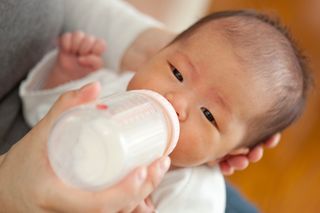 Nothing beats mother’s milk when it comes to helping infants thrive. It contains all the vitamins and nutrients a baby needs in its first six months of life. Breast milk is especially good for premature babies because it is also filled with disease-fighting substances and is much easier for their underdeveloped GI tracts to digest.
Nothing beats mother’s milk when it comes to helping infants thrive. It contains all the vitamins and nutrients a baby needs in its first six months of life. Breast milk is especially good for premature babies because it is also filled with disease-fighting substances and is much easier for their underdeveloped GI tracts to digest.
But many preemies can’t get the breast milk that is so essential to their well-being; the sucking motion needed to nurse is not yet developed. In addition, while moms of preemies are encouraged to pump milk for their babies, not all mothers are able to pump due to certain medical conditions while others attempt to pump but don’t make enough.
Now, HUP’s new Donor Milk Program will help bring this powerful ‘medicine’ to its tiniest patients.
Donor milk is breast milk that is pumped by a mother who is not the baby’s birth mother. Although a mother’s own milk is best for her baby, donor milk is a close second in terms of benefits. HUP’s donor milk program will provide this milk to babies in its Neonatal ICU who weigh under 1,000 grams (the equivalent of a mere 2.3 pounds) and whose moms are not capable of pumping milk or not making enough. “It will be for our most vulnerable infants,” said Laura Carpenter, BSN, RN, IBCLC, who led the initiative with Christine Jaslar, RN/IBCLC, both part of HUP’s Lactation Team. “Our goal is to provide donor milk to every infant who needs it.” She added that it could also be made available for other newborns in special circumstances, to be decided on a case-by-case basis. HUP and Children's Hospital are the only birth hospitals within city limits offering this type of program.
All of HUP’s donor milk will come from a nonprofit donor milk bank which thoroughly screens donors before accepting their milk and then, after receiving the milk, pasteurizes it. “We’ll keep it on hand for when it’s needed,” Jaslar said. It can last up to a year frozen.
Donor milk is not inexpensive. It costs about $4.25 per ounce, and demand for it has spiked even among moms of healthy infants who are unable to provide milk for their babies, so much so that a bustling underground market for the sale of breast milk has sprung up, with volunteers orchestrating so-called “milksharing” networks among women with pumped milk to spare and those who need it for their infants. But for the tiniest babies at HUP, the return on investment is huge. “Preemies given mother’s milk get discharged three to four days sooner and also have a six to 10 times lower risk of getting a gastrointestinal complication called necrotizing enterocolitis,” Carpenter said, adding that the infection can cost up to $250,000 to treat. The average cost to provide a preemie with donor milk: $125.
The program’s initial funding came from HUP’s Magnet Gala Community Outreach fund. At the program kick-off, Victoria Rich, PhD, chief nurse executive of UPMC -- and a longtime proponent of breastfeeding -– said the fund would provide $10,000 annually to this program.
“This is one of the most satisfying things I’ve done since coming here,” said Iyalla Peterside, MD, director of the Neonatal ICU, who was part of the multidisciplinary effort to get the program up and running. “When you do things for your patients and their children … there’s nothing better.”